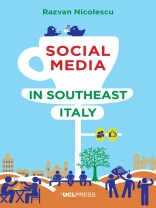Why is social media in southeast Italy so predictable when it is used by such a range of different people?
This book describes the impact of social media on the population of a town in the southern region of Puglia, Italy. Razvan Nicolescu spent 15 months living among the town’s residents, exploring what it means to be an individual on social media. Why do people from this region conform on platforms that are designed for personal expression?
Nicolescu argues that social media use in this region of the world is related to how people want to portray themselves. He pays special attention to the ability of users to craft their appearance in relation to collective ideals, values and social positions, and how this feature of social media has, for the residents of the town, become a moral obligation: they are expected to be willing to adapt their appearance to suit their different audiences at the same time, which is crucial in a town where religion and family are at the heart of daily life.
Praise for Social Media in Southeast Italy
‘Social Media in Southeast Italy is an interesting read, especially valuable for scholars of contemporary Italian society, and for researchers interested in ethnography in a digital age. I applaud Nicolescu and the rest of the Why we Post team for humanizing social media use amid a growing gravitation toward “big data” research.’
New Media & Society
表中的内容
Introduction: Grano, an average place in southeast Italy
The social media landscape
Visual postings: looking for ‘the good’
Social media and social relationships: setting layers of intimacy
The imposition of beauty
The wider world: ideals of work and ideals of education
Conclusion
关于作者
Razvan Nicolescu is a Research Associate at University College London, from where he obtained his Ph D in 2013. Trained both in telecommunications and anthropology, he has conducted ethnographic research in Romania and Italy. His research interests focus on visibility and digital anthropology; political economy, governance, and informality; feelings, subjectivity, and normativity.












